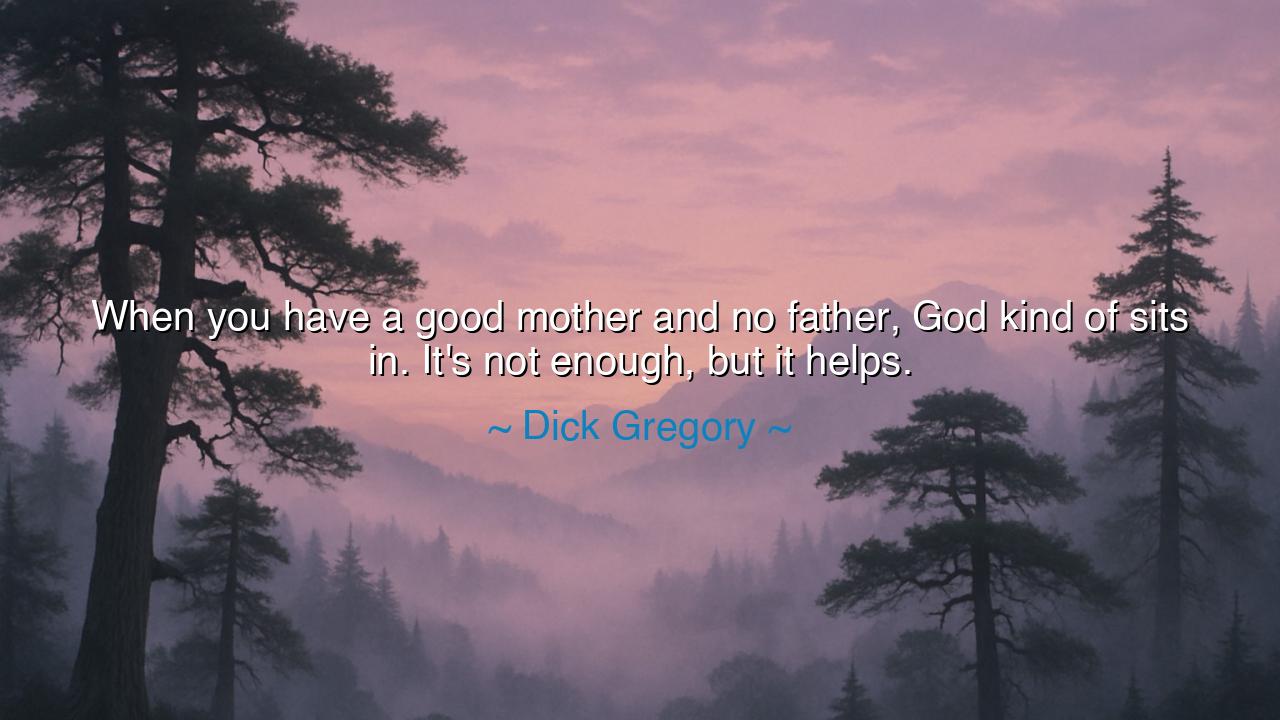
When you have a good mother and no father, God kind of sits in.
When you have a good mother and no father, God kind of sits in. It's not enough, but it helps.






In the profound and soul-stirring words of Dick Gregory, “When you have a good mother and no father, God kind of sits in. It’s not enough, but it helps.” we hear not only the pain of absence but also the quiet miracle of endurance. These words, though wrapped in humility, speak of both loss and grace—the ache of growing up incomplete, yet somehow held together by love and faith. Gregory, who rose from the hardships of poverty and fatherlessness to become a voice for justice and truth, understood what it meant to walk the earth half-shadowed by what was missing and half-lit by what was divine. In this quote, he does not glorify suffering, but sanctifies survival. He tells us that when life withholds what we need, love and faith conspire to give us just enough to continue.
The origin of this quote lies in the story of Gregory’s own life. Born in St. Louis in 1932, he grew up in a household without a father, his mother struggling alone to raise her children. She worked tirelessly—scrubbing floors, serving others, sacrificing her own rest—so that her family might endure. Yet even in their poverty, she planted in her son a seed of resilience, a sense that though they had little, they were not forsaken. In her strength, he saw something sacred: a power beyond human endurance, as if God Himself had leaned down to help. Through his mother’s faith and labor, Gregory felt the nearness of the divine—not as a distant deity, but as a quiet presence that steadied them through their trials.
To the ancients, this truth would not be strange. For they too believed that the divine dwells most closely with those who suffer yet continue to love. In the tales of old, the widow and her child were under the protection of the gods. The ancient prophets and poets spoke of a God who “becomes a father to the fatherless and a defender of widows.” Gregory’s words are an echo of this timeless faith. When he says that God “kind of sits in,” he is describing the mysterious grace that enters the gaps of human life—the invisible hand that strengthens the weary mother, the unseen love that whispers to the lonely child, “You are not forgotten.”
Yet he adds, with piercing honesty, “It’s not enough, but it helps.” In those few words lies the full weight of human longing. For though faith may comfort, it cannot replace the father’s arm that never held him, the presence that never was. This admission makes Gregory’s wisdom all the more powerful. He does not preach false consolation. He does not say that faith erases pain. Instead, he tells the truth—that even when God sits beside us, the empty chair still remains. And yet, that small divine comfort, that faint but steady light, is sometimes all we need to make it through the darkness.
We see this same truth in the life of Frederick Douglass, the great abolitionist. Born into slavery and separated from his mother as a child, he knew the ache of absence more deeply than most. Yet the few times he saw her, walking miles through the night only to hold him before dawn, left a mark that shaped his soul. Through her brief, sacrificial love, he glimpsed something eternal. And though she died when he was still a boy, her strength became his faith. He would later say that the spirit of freedom in him began with her. Like Gregory’s mother, she too was the vessel of both human love and divine endurance.
From these lives we learn the sacred power of the mother’s heart, that oldest of sanctuaries. The mother who stands alone must become many things at once—provider, protector, comforter, teacher—and in this transformation, something divine stirs within her. Her love becomes the channel through which heaven touches earth. But Gregory’s words also remind us of something greater still: that God does not sit only with the mother, but also with the child who feels the absence of a father. The divine sits beside the lonely, the broken, the uncertain, lending them the strength to one day stand on their own.
Let this truth be passed down as wisdom for all generations: when life leaves you incomplete, fill the void with faith, gratitude, and love. If you were raised by one, honor them twice. If you were raised by none, know that something greater still watches over you. And if you are a parent standing alone, remember that every act of love you give—every meal cooked, every tear wiped, every prayer whispered—becomes a partnership with the divine itself. For as Gregory said, it may not be enough, but it helps. And often, in this world of imperfection, that help is the miracle that keeps us alive.
Thus, in the end, Dick Gregory’s words are not only about the bond between a mother and her child, but about the unseen partnership between human endurance and divine grace. His mother worked with her hands; God worked through her heart. And through their shared strength, a child without a father grew into a man who changed the world. This is the eternal teaching: that when love stands where something is missing, God has already taken His seat.






AAdministratorAdministrator
Welcome, honored guests. Please leave a comment, we will respond soon